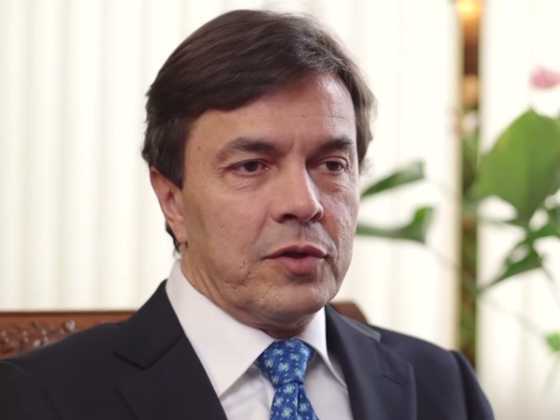GUAXUPÉ, Minas Gerais, Brazil – The Colombian delegation headed by Roberto Vélez (picture), CEO of the Colombian Coffee Growers Federation (FNC), concluded a weeklong visit to Brazil with important results.
The delegation visited Brazil’s main coffee-producing regions and met with senior local government officials and representatives of Brazil’s main exporter and equipment manufacturers.
The visit started with a meeting with Brazil’s Deputy Minister of Agriculture, Francisco de Assis da Silva Lopes, senior Brazilian officials of that Ministry and other government instances.
The meeting reopened spaces for knowledge exchange and joint work between Colombia and Brazil, two leading coffee-producing countries worldwide.
Impact of drought on Brazil’s coffee regions
The delegation visited Brazil’s main coffee regions, including the states of Bahia, Minas Gerais, Sao Paulo and Espirito Santo, in southeastern Brazil. The heterogeneous impact of drought on different states was one of the issues discussed during the visit.
Interviews with technical assistants and coffee growers of Espirito Santo exposed the devastation generated by the dry season. Over the past three years, drought has struck Espirito Santo and led to a decrease in Robusta coffee production of between 45% and 55%.
The impact of drought, however, was less severe in states such as Bahia.
The delegation visited several coffee farms and observed Robusta crops at different development stages: from planting to production.
Bahia producers noted that despite the dry season, productivity and competitiveness remained high thanks to irrigation.
Agronomic mechanization for small-scale coffee growers
In Minas Gerais, the Colombian delegation witnessed Brazil’s advances in agronomic mechanization for small-scale producers in gentle-slope terrains.
The system consists of motorcycles converted into tricycles, which enable producers to perform different tasks, including application of fertilizer and organic matter, liming, weeding and spraying.
The idea behind the tricycles is to overcome the region’s labor shortage and increase productivity. Minas Gerais producers noted that these vehicles may decrease labor costs by 50% in the region.
Colombian delegation visited Brazil’s largest coffee cooperative
Potential business partnerships, specialty coffee, coffee policies and dynamics of the Brazilian coffee industry were some of the issues discussed by the Colombian delegation and leaders of the Cooxupé Cooperative, headed by its president, Carlos Alberto Paulino da Costa.
During their visit to the cooperative’s facilities, Colombian delegates were introduced to Cooxupé’s Big-Bags used in coffee warehouses (a technology associated with inventory management), the coffee threshing and classification sections, in-bulk storage in silos, and new coffee roasting and packaging developments.
The cooperative organized two academic lectures. The first was a comparative analysis of coffee production costs in different regions within Minas Gerais.
It presented information on productivity and cost per hectare. During the second lecture, Hernando Duque, Chief Technical Officer of the FNC, described the FNC’s technical area and history.
He also presented an overview of Colombia’s current coffee production and of strategic actions carried out to strengthen profitability.
Visits to companies pioneering agricultural equipment production
In the state of Sao Paulo, the Colombian delegation visited the companies Jacto and Brudden.
The former leads production of spray equipment for agricultural producers of all sizes. Brudden, on the other hand, has pioneered since 2002 the development of a machine to bring down coffee, used by small-scale producers at harvesting in sloped terrain.
This machine has been tested in Colombia in studies conducted by Cenicafé.
During the visit, Colombian delegates made a series of design and operational requests to Brudden engineers, requests that had a positive reception.
Before concluding the visit, the Colombian delegation toured the Recreio farm, located in Veracruz, and witnessed experimentation with new coffee varieties and a practical exercise with Brudden’s machine to bring down coffee.
The FNC CEO highlighted the importance of establishing strategic partnerships focused on advancing technological developments for coffee harvesting and agronomic tasks in Colombia’s coffee regions.


















